Spring (Sept-Nov) 2014
David Gerrold and the Crunch of Ideas
I like the crunch of ideas. I like the chewiness of thought. I like the discovery of new places, new experiences -- and most of all, I like it when I discover something new about who I am, who we are as human beings, and what our place might be in this universe. - Gerrold, Facebook 2014
American author David Gerrold is widely known as the man who wrote Star Trek's The Trouble With Tribbles. While there is no doubt that his professional life, and what he calls his 'brand' has been defined by the tribbles and his work with the iconic television series, Gerrold continues to be a prolific and busy writer.
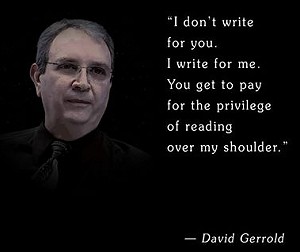
His followers and friends on Facebook are treated to the status of his latest work, dreams and other inspirations, and updates on what is in print.
He posts about his life, his politics, his curmudgen-ness, his son, his dreams, and anything else that catches his attention.
For a writer, life is grist for the mill. Those who read Gerrold's novels and short stories, as well as those who follow his Facebook posts, can trace the development of his ideas and opinions.
Writes Gerrold, "If you're following my journey, if you follow any writer with a smidge of courage, you're going to be startled, outraged, offended, upset, irritated, annoyed, and just plain pissed off. If you're not -- I'm not, he's not getting his job done. But also, if you're following a good writer's journey, you're going to be charmed, surprised, enchanted, enlightened, illuminated, and ultimately expanded with a greater sense of awe and wonder about the joyous adventure of life."
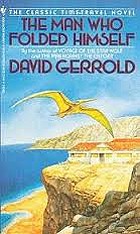
Gerrold may have made fans with Tribbles, but he startled many, and put science fiction in the gay bookstores with his novel The Man Who Folded Himself. More than just a time travel story, it questioned the notion of gender and sexuality before there was an acronym for the movement.
Gerrold considers challenging the readers to be part of his job, just as challenging himself is part of his craft. He says, "I'm here to challenge the status quo. I'm here to challenge complacency and stupidity and rattle the bars of the comfort zone. I'm here to grab hold of an idea, shake it till it hollers, hold it up to the light and look for secret messages, and beat it with a hammer until it tells me where the plans to the death star are hidden."
He writes about humans and aliens, about human crises of belief and faith. His script for Babylon 5 (Believers [1994]) addressed the issue of parents who refuse medical help for their children based on religious grounds.
But Gerrold is pragmatic, too. "Someone once asked me what kind of a writer I want to be." Gerrold writes on Facebook, "I said, I want to be the kind of writer that when a manuscript arrives on the editor's desk with my name on it, he shouts 'Oboy!' and puts it on the top of the stack."
Gerrold's career has spanned decades. It has seen changes in the industries he writes for, and in society. How has his attitude towards his work has changed? For Gerrold, the mechanics of writing is different, and it has affected the way that he approaches his craft.
Gerrold says, "Forty-five years ago, I used to love the clickety-clackety feeling of the IBM Selectric keyboard. Nothing I've used since then, since we've switched over to computers, has been as physically satisfying. On the other hand, I do like working on a great big screen and watching the words appear, almost like magic. So I have a different relationship with the text."
"When I used a typewriter, I was committed to turning in a clean crisp manuscript, so if I wanted to make changes, I'd retype the whole page. That little bit of obsessive-compulsiveness encouraged me to add, flesh-out, cut, rewrite, rephrase, and polish every time I retyped a page. And if I made a lot of changes, some sections would get retyped and rewritten a dozen times."
"That taught me a lot about polishing and self-editing, because I was taking a second and third and fifteenth look at everything I was writing, so if/when I typed something clumsy or stupid, it would leap off the page at me later on and I'd fix it."
"Before, I could type. Now, I can write."
"Eventually, I learned to recognize most of my worst habits before I typed the words onto the page. So what has shifted for me is something I would call "the level of competency." Before, I could type. Now, I can write."
He continues, "Let me say that a different way. When I started out, I was always painfully aware that I did not know how to write, did not know how to tackle or solve any of the ten godzillion challenges I would be facing. Writing is a decision-making process. This word or that one, this sentence of that one, this idea, this paragraph, this character, this point of view, this voice, this anything -- everything is a decision. And if you have no experience with that process, everything is a struggle up a very steep learning curve."
"It's not about knowing how to type, it's not about filling the page with words. It's about knowing which words to use to get you where you think you want to go."
"Now -- all these centuries later, with a smidge of experience, I know a little bit more about how to beat the language into submission, how to get from there to here, so the decision-making process isn't so much about the creepy crawly little insect marks on the page, the words flow by themselves -- no, the decisions are now being made at a higher level, a meta- level, if you will."
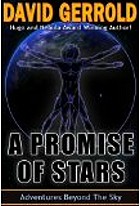
"Now, I'm focusing on character, on emotions, on subtext, on what's not being said, on depth, on ambiance, on mood -- and these things are much much harder, so what's changed is that nothing has changed, I'm still on the steep learning curve, but it's a different curve than the one I was on when I began. I'm tackling the next set of challenges."
"If I have to point to anything in my attitude that has changed, I'd say that 1) I've traded in arrogance for confidence in my own ability to tackle the blank page, and 2) I'm setting myself a lot of different challenges than I would have in the past."
Being so identified with Star Trek has both helped and hindered his career. He says, "It opened a lot of doors, still does. It's closed a few too. But my work for Star Trek has touched hundreds of millions, perhaps billions of people. That's a credential to be proud of."
Gerrold is one of many science fiction authors whose interest is in the science or technology, not just the fiction. He wrote popular articles and columns for the computer magazines at the height of their power. His interest in the guts of computers continues to this day, but how did he start writing for the magazines?
"I started building my own computers in 1978...I loved the adventure."
"I started building my own computers in 1978. I wrote some of my own utilities too. I loved the adventure -- we were inventing a new technology and using it to reinvent the world. A lot of science fiction authors and fans were into computers and a lot of people in the computer industry were also big science fiction fans, so there was enough overlap that people like myself and Jerry Pournelle were often invited to write for various publications. I've written for PC Magazine, PC-Techniques, Profiles, InfoWorld, Creative Computing, MaximumPC, and at least a dozen other computer zines. Sometimes I'd be good enough, they'd ask me to come back."
"But the magazines are disappearing, being replaced by websites, which is both good and bad. I miss the monthly adventure of going to the newsstand. While the websites can present a lot of information a lot faster, it doesn't seem to have the same impact. Maybe that's just me. Or maybe it's that the signal-to-noise ratio had gotten untenable."
"I still follow PC-Magazine, PC World, and MaximumPC, but sometimes I feel as if a lot of the adventure is gone. Perhaps that's because the technology has finally matured to the point where it's just another fact of life, we're just using it, no longer inventing it."
"For me, a series has to be about the growth of the hero over time."
Series are beloved of readers and publishers. What is the attraction of a series to a writer? What makes a world enjoyable enough to return to again and again?
"There are two ways to do a series. One way is to have every book or episode be stand-alone. That means the heroes can't really change or evolve. They just have one adventure after another. Sherlock Holmes is a good example of this. So is classic Star Trek.", Gerrold says.
"The other way is the mini-series approach -- the series is really one long novel, so big it takes several books to tell it. Game of Thrones is a good example."
"For me," says Gerrold, "a series has to be about the growth of the hero over time, what he learns, how he becomes the person he is after his soul has been challenged."
"But to answer the specifics of the question -- what makes the world enjoyable enough to return to? It's that there are more things yet to be explored, discovered, and learned. In the case of the Chtorran invasion, there are still large pieces of the Chtorran ecology to write about. I want to keep digging."
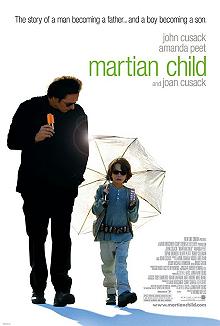
One relationship in Gerrold's life that has obviously inspired his work is his adoption of son Sean. Their journey towards one another was alluded to in the novel, and film, The Martian Child.
Of Sean, Gerrold says, "Back in 1992, I told the caseworkers, "If he has a big heart, I'll know it, I'll see it. That's all I need to know about this little boy." I saw his big heart in the first five minutes, it took that long to fall in love with him.
He continues, "It took a while for him to learn -- I had to work hard to prove it to him, because no one else ever had -- but I'm his dad for keeps. I believe in him a thousand percent. And I'll never quit on him. Anyone who thinks they're going to play one of us against the other (and some have tried) will quickly discover what it means to be left by the wayside."
Did Gerrold find it different to write autobiographical material?
He says, "It was easy to write The Martian Child, because I had a wealth of source material. I left out anything that would be deeply embarrassing to either me or my son, because I think both of us are entitled to our privacy -- but I shared all the best parts about how we learned to be a family together. There were some adventures we had that were so perfect all I had to do was type them up -- I didn't have to write anything at all. The whole "pickled mongoose" incident for instance is almost word-for-word exactly as it happened."
"The movie version had very little of the original story in it. My feeling is that the scriptwriters didn't really understand the source material very well -- instead of writing a movie about relationships, they wrote a movie about "stuff." We lived a drama, they wrote a sitcom. So I found the movie disappointing."
"...getting online is a chance to touch base with other human beings..."
Gerrold has a strong facebook presence, and uses it to address a variety of issues. What does social media mean to him as a person, and as a writer?
Gerrold says, "I have a website, www.gerrold.com, where news is regularly posted, but Facebook is my primary social outlet online. It's a place to stay in touch with friends and family. It's also a place to observe, comment, share, vent, explore, discover, learn, and simply connect with others."
"Writing is a lonely job. You sit alone in a room and talk to yourself, that can get pretty intense sometimes -- so getting online is a chance to touch base with other human beings -- it's also an opportunity to refresh the relationship with the source material, other human beings."
"One of the things I do enjoy is that I can ask the group mind a question and in a very short time, I'll get back dozens of useful answers, usually coupled with insights that expand my awareness of whatever it was I was asking about."
On Facebook, Gerrold sometimes talks about the need for a writer to work on the commercial side of writing. Of developing a 'brand' that is recognisable, and saleable. We asked Gerrold, how he would describe the David Gerrold 'brand'
He replied, "I have no idea. Honest."
"In my vainest moments, I'd like to think that the readers will perceive my work as well-crafted and worth reading. What I aspire to create are interesting characters, challenging situations, interesting dialog, and satisfying conclusions."
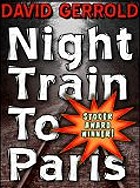
"Because I also like to try on as many different genres and voices as I can imagine, there is no specific kind of story I've written that you could point to and say, "Okay, this is a typical David Gerrold story." So how do you reconcile The Martian Child with thirteen o'clock or Dancer In The Dark or Night Train To Paris? (And I've got half a dozen more stories coming out next year which will challenge that even more.)"
"I would say that the only common thread is that my characters tend to be self-aware problem-solvers who think about things a lot. A lot of my work is introspective."
"But I could be wrong about all of the above. I think it's up to the readers to let me know what they're perceiving as my 'brand.'"
"... as a writer, as a voice, I want to be entertaining and useful..."
On facebook Gerrold said, "as a writer, as a voice, I want to be entertaining and useful. That's it." Does he seek a balance between the two, or does he see one or the other as a more important aim in his writing?
"I try to be entertaining first." Gerrold says, "Otherwise, the reader puts the story down and doesn't come back. If it's useful, it's because somewhere in the introspective part of the storytelling, I have an insight to share. But what I know about insight is that it's not enough to hand out insights, there has to be something at stake. You have to experience it before it's real -- so the story is the opportunity to live it as a moment, rather than be handed it as just another fortune cookie."
On facebook (19/7/2014) Gerrold said "I'm here to challenge complacency. The status quo is the enemy." Does he believe that science fiction gives him a voice to do this?
"Yes. 1984, Brave New World, Fahrenheit 451, The Left Hand of Darknesss. I rest my case."In A Matter for Men (1983) Gerrold has Whitlaw state, "You are responsible for the actions of your government. It acts in your name. ... The system is continually falling into the hands of those who are willing to manipulate it for short-term gain - because we let them." Does Gerrold believe that himself?
"Yes." says Gerrold, "Now more than ever."
If he was remembered only for one piece of work that he had done, what would he like it to be?
"The Martian Child."
David Gerrold has been in the science fiction field for the fans, if not the science fiction establishment, to consider him a grand master. He has fascinated and entertained generations, and because of his craft, he has the potential to entertain for generations to come.
He is also a presence in science fiction -- the fandom and the general readership. He excites wonder and anger in his work, and in his social media activity. He shares what makes him particular in the field: his big heart and his crunchy ideas.
David Gerrold answers The Usual Questions
David Gerrold's web site www.gerrold.com
David Gerrold's film and television credits on IMDb
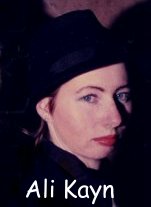
Ali Kayn is a journalist and editor and publisher of Festivale Online Magazine. For more by Ali, use the Festivale search site field in the search box.




 Published in Melbourne, Victoria, Australia
Published in Melbourne, Victoria, Australia